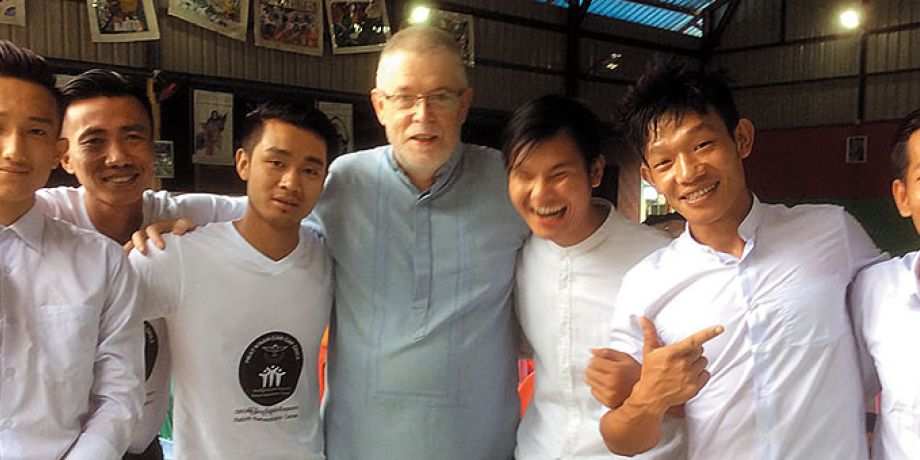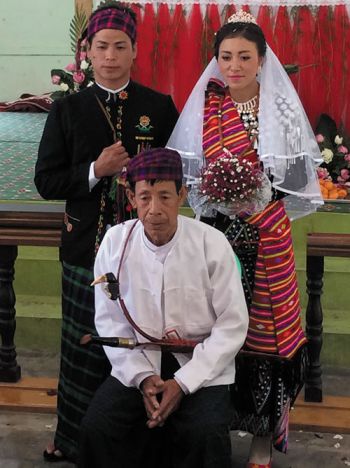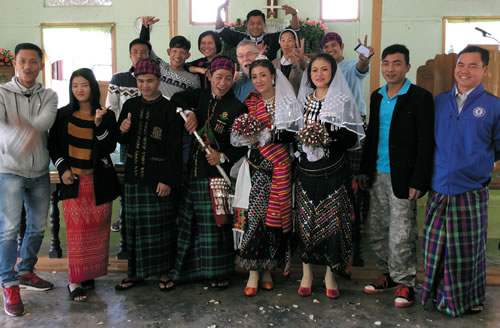
Battling Drug Addiction
Every family in Kachin State in northeastern Myanmar, formerly Burma, seems to be affected by drug and alcohol addiction. For over 60 years this area has known only war as the Kachin Independence army and the Burmese military battle for control of this resource rich state. As in all military conflicts, it is the ordinary poor people who suffer most as they struggle to make a living. People are poor and live mostly by subsistence farming or by working in the jade mines. Many people are killed each year in landslides at these unregulated mines. After the latest upsurge in the conflict in 2011 over 130,000 have had to flee their villages and now live in camps for internally displaced peoples. This area is also the greatest source of heroin in southeast Asia with many poppy plantations in remote areas. The drug and jade barons get rich while many poor young people become addicted to heroin and opium. These drugs are cheaply and easily available.

I first met Naw Lat just over a year ago. He was a volunteer at the Rebirth Rehab center in Myitkyina, the capital of Kachin state. The center was founded in 2015 by the Catholic Diocese of Myitkyina to try and respond to the drug epidemic. Like many young people, he started experimenting with drugs and alcohol when he was a teenager. He had no work, and his options were to help his family in making traditional alcohol or work in the jade mines. At 26 years of age, he came to the center because he was tired of using drugs, his life had become unmanageable. His family were tired of him and wanted him out of the house. At the center he received the medical treatment he needed and started taking the antiretroviral drugs that he would need to deal with his HIVpositive status. He ate well, and attending all the sessions, he began to gain weight and strength. He relapsed shortly after finishing that first program. He returned for the third program, and when it was over he volunteered at the center. That is when I met him. While he looked strong, he was still using secretly, and his addiction still had control of him.
That first day I met him he looked at me a little suspiciously. I remember him because he ran over to take my bag but he didn't speak. I guess he was wondering who this strange, big foreigner with a beard was.
I began to meet with him and six other recovering addict volunteers. Of course my language is very limited, but by the grace of God one of the guys spoke good English and helped me with translation. Our meetings were in the afternoon at 2 p.m. It was June, and it was hot, and everyone struggled to stay awake, including me. Naw Lat in particular struggled. One day as I was talking his head suddenly hit my shoulder as he had fallen fast asleep. It was not very encouraging. If they were to have any chance of receiving the message the time of our meeting would have to be changed. We moved to 7 a.m. in the morning when it was much cooler. In the morning, people were awake, but they were not sober.

At these meetings they shared their stories of addiction and the hopeless place it had led them to. They shared their fears about the war and about feeling they had no future. There was a lot of pain and hopelessness in their sharing. Naw Lat also shared with me. "Wajau, (Father) I have messed up my life. I am 27 years of age, and I have been a heroin addict for more than 10 years. I have no job my family don't trust me and want me out of the house and I am HIV positive. I came here because I have nowhere else to go, and I am afraid I'm going to overdose and die. But I can't seem to stop" he told me. "If you are really tired and are willing to do anything to stop then there is a solution," I told him.
I began to introduce him and the others to the spirituality of the 12 step programs of Alcoholics Anonymous and Narcotics Anonymous, to the concept of powerlessness and the need to surrender to a higher power. I told them that they only had to stay sober for this 24 hours that tomorrow was another day. The center offers programs such as self-awareness, personal leadership, and cognitive behavioral therapy. Naw Lat and some of the others started to stay sober one day at a time.
Three months ago Naw Lat celebrated one year of sobriety. His life has changed dramatically. In this year he joined a Karate Club and has reached brown belt status. He has been employed by the center as a staff member. He has made amends to his family. His mother was recently diagnosed with terminal cancer, and he has taken leave from the center to be at home taking care of her. In the midst of her illness his mother is so happy that her son is sober. Just last week he got married. He comes to meetings, and he is staying sober.
A year ago, none of this was possible for him. Now there are over ten people with one year or more of sobriety. Recovering addicts are helping other recovering addicts, and the message of recovery is spreading. Even in the midst of war and hopelessness recovery is possible for those who really want it.
Financially we operate month to month depending on the generosity of local people who are already poor but who give from the little they have because they want to do something about the scourge of drug addiction.
Columban Fr. Eamon Sheridan lives and works in Myanmar (formerly Burma).